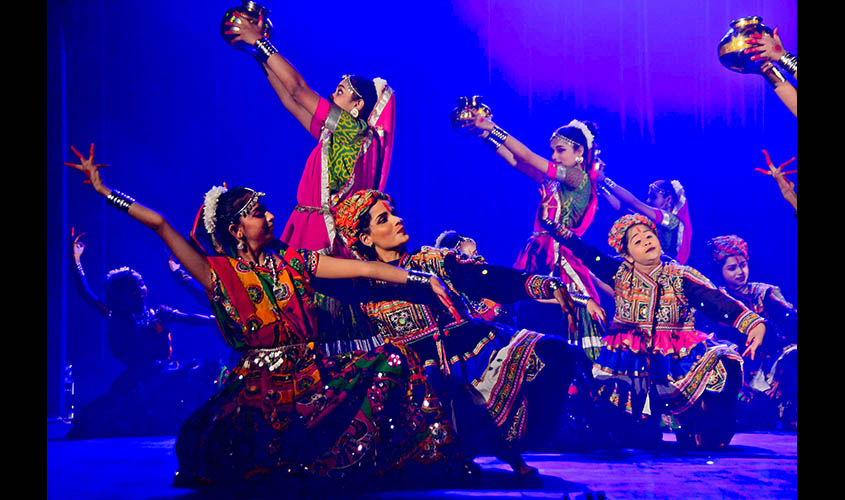Concluding this Sunday, the Tagore International Literature and Arts Festival in Bhopal is a forum that celebrates Rabindranath’s influence on cultures outside Bengal. By Rishita Roy Chowdhury.
‘Let’s do something to celebrate Rabindranath Tagore’s legacy,” was the thought that became Santosh Choubey’s dream. It’s a dream that took three years to shape and turn into reality, with the first edition of Tagore International Literature and Arts Festival now taking place at the Rabindranath Tagore University in Bhopal.
Choubey is the founder and chairman of AISECT Group of Universities, chancellor of the Rabindranath Tagore University, and director of this four-day festival that began on 7 November and ends today, 10 November.
When the organisers decided to curate this festival, they wanted to celebrate the contributions and influence of Tagore in the spheres of Indian literature, arts and culture. But it took them some time to come to terms with the immense scale of this task.
Naturally, the question loomed for a couple of months—how does one do justice to what Gurudev achieved in his lifetime, over the duration of a festival that would run only for a few days?
According to Leeladhar Mandloi, a poet, critic, writer and co-director of the festival, the organisers came up with the idea of putting together a pan-India cultural tribute to Tagore. This tribute was going to be different from what is usually done to memorialise Tagore in the context of Bengali culture. What this event seeks to highlight is Tagore’s lasting influence outside Bengal, in the domains of Hindi and other regional languages. This focus on vernacular languages is the reason why this festival has been given a second name, Vishwa Rang.

Mandloi said, “Tagore’s work is so diverse…from music, literature to theatre and philosophy. Hindi-speaking regions should be aware of his genius. That’s something we are trying to achieve through this festival.”
Another distinguishing factor here is that the festival aims to create awareness of India’s literary and artistic cultures on the grassroots level. Santosh Choubey said, “Popular festivals don’t connect with people on the grassroots level. They don’t go to such people and are organised in bigger towns. I felt that local connect was missing and wanted to bring in more people. In this fest, Indian languages are the focus and all are being treated equally. We wanted regional languages to get their due.”
More than 500 artists and authors from over 30 countries are participating in the event. These include prominent figures from the fields of culture and politics, as well as scholars from prestigious universities of the world.
Listed on the event’s billing are panel discussions (on topics like “World Poetry”, “International Mushaira”, “Discourse on Tagore, Gandhi and their Contemporaries”); readings by emerging poets and writers; musical performances by popular musicians; and art exhibitions.
At the event, Katha Desh—an 18-volume collection of 630 short stories by various authors from across India, written over a span of 200 years—was also released.
Choubey is a poet and writer himself, and he feels that our traditional arts can only be preserved if we get more people from different states and social strata involved in this project. So in September this year, his team organised a “Pustak Yatra”, which travelled to 55 locations across India, engaging the locals and motivating them to present their poems. Around 1,000 writers participated in it.
A youth festival was also held in the days leading up to the Tagore Festival. About 100 schools were covered and some 100,000 students attended and participated in it. Discussions on literature, theatre, dance and music were held.
The aim of Tagore International Literature and Arts Festival is not just to reach out to all parts of India, but also to explore the current standing, literary and social, of the Hindi language. So 15 professors from different countries have been invited to discuss the demand of Hindi language in the world as part of the “Hindi and the World” segment of this festival. These professors travelled from Russia, Sweden and Ukraine among other countries. The idea is to understand the challenges involved in teaching Hindi outside India. They are here to talk about the kind of curricula they are following and whether these are modern enough to reflect the current trends in Hindi. Students from Japan, China and Russia, who are students of Hindi, are also participating in the festival.
Discussion on contemporary culture is also on the agenda. A detailed exploration of how social media is transforming the way we think and talk, and changing the fabric of our languages, has also been planned. Choubey pointed out that languages are being completely transformed because of social media. Hence, he found it crucial to bring to this event young people who write poetry and short stories online. He said, “Those who write on social media and have a huge fan following, we wanted to have a discussion with them on how language is changing on social media platforms.”
A remarkable aspect of this festival is that for the first time a major platform has been given to third-gender poets. Dhananjay Chauhan, a transgender poet who participated in the event, said, “This fest has provided me with a platform to share the life struggles of the transgender community through my poetry recital. My intent was to share how I struggled to get education and other basic human rights as a transgender. The society doesn’t understand us or the challenges we face, and there’s no equality. My poetry is my weapon to bring some change.”
As for Tagore, an exhibition at the venue featured some of his paintings. There were discussions on Tagore’s plays and his unique style as a playwright. The festival also showcased how Rabindra Sangeet has influenced Indian film music, and many acclaimed performers from Bengal sang Tagore’s songs, and his magnum opus Geetanjali was performed at the venue.

